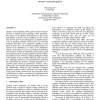Free Online Productivity Tools
i2Speak
i2Symbol
i2OCR
iTex2Img
iWeb2Print
iWeb2Shot
i2Type
iPdf2Split
iPdf2Merge
i2Bopomofo
i2Arabic
i2Style
i2Image
i2PDF
iLatex2Rtf
Sci2ools
101
click to vote
WSC
2000
2000
SNOOPy Calendar Queue
Discrete event simulations often require a future event list structure to manage events according to their timestamp. The choice of an efficient data structure is vital to the performance of discrete event simulations as 40% of the time may be spent on its management. A Calendar Queue (CQ) or Dynamic Calendar Queue (DCQ) are two data structures that offers O(1) complexity regardless of the future event list size. CQ is known to perform poorly over skewed event distributions or when event distribution changes. DCQ improves on the CQ structure by detecting such scenarios in order to redistribute events. Both CQ and DCQ determine their operating parameters (bucket widths) by sampling events. However, sampling technique will fail if the samples do not accurately reflect the inter-event gap size. This paper presents a novel and alternative approach for determining the optimum operating parameter of a calendar queue based on performance statistics. Stress testing of the new calendar queue, ...
Calendar Queue | Discrete Event Simulations | Future Event List | Modeling And Simulation | WSC 2000 |
| Added | 01 Nov 2010 |
| Updated | 01 Nov 2010 |
| Type | Conference |
| Year | 2000 |
| Where | WSC |
| Authors | Kah Leong Tan, Ian Li-Jin Thng |
Comments (0)

